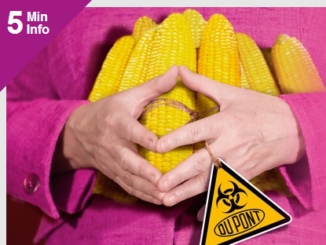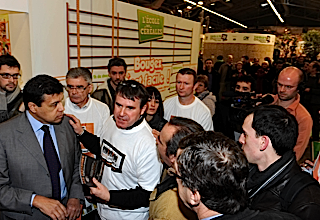
Germany and France have common interests in the CAP reform, and are openly working closely on the process – developing common positions and shared objectives. On 6th February 2012, the two countries released a joint statement outlining their current priorities in the negotiations. Here is the translation:
Since September 14th 2010 France and Germany have presented joint proposals for a strong CAP. These proposals are now at the centre of the negotiations taking place between the Commission, the European Parliament and Member States. Given the economic crisis facing the European Union, France and Germany remain convinced that a sustainable, productive and competitive agriculture sector is important for growth and employment in Europe. The European Union needs a strong CAP after 2013. It will take resources to meet our goals. Agriculture needs stability and visibility. A final decision on all questions relating to financial issues will be made in connection with all policies and within the finanical framework of the entire EU.
The Commission’s proposals regarding the CAP after 2013 will fundamentally change the face of agriculture. As negotiations go into a crucial stage, France and Germany would like to clarify thier common position on the following points:
– The proposal to redistribute aid between the Member States put forward by the Commission, strengthens the legitimacy of the Common Agricultural Policy in that it takes the different economic conditions of each Member State into account. In this regard any instrument for the redistribution of direct payments between Member States should be carried out gradually and be limited in scope so as not to disturb the internal balance within the European Union. The two pillars of the CAP should also be integrated to ensure a global approach is taken.
– The principle of greening direct payments is a good opportunity for the sustainable development of European agriculture. However some procedures proposed by the Commission run the risk of not being appropriate for the current economic situation or the challenges facing agriculture. As the first exchanges in the Agricultural Council have shown, considerable discussion is needed in terms of the design of the greening and ecological focus areas. The Commission’s proposals must also be improved, among other issues, in terms of enhancing breeding pastures, new sustainable production systems, simplifcation of cross-compliance measures, pragmatic solutions to specific operating models and an minimisation of administrative costs by overall simplification.
– The Commission proposes a dynamic of convergence of aid between companies within Member States and regions. Such a dynamic should aim to strengthen justice in terms of aid. However, the economic situation and different conditions of individual companies should be taken into account, leaving Member States room to act in relation to the subsidiary implementation methods.
– The principle of subsidiarity and the consideration of features specific to certain regions should also serve as a guide when considering the following proposals: setting an upper limit, zoning of vulnerable areas and mountain regions, introducing special instruments for young farmers and smallholders, definitions of “active farmers” and support for weak sectors.
The present market instruments (especially intervention, private storage) are part of a safety net to protect agriculture in the face of major crises in Europe. Some of these need to be improved so that they can be effectively implemented and simplified. It is vital that they can be mobilized effectively and quickly in times of financial crisis. The discussion in terms of ending the sugar quota system needs to be done so that the adjustment process is not compromised. The planting scheme for vines should be continued. The position of the producer should be strengthened; however, it must not distort competition within the internal market.
Finally, it must be clear that a common policy only makes sense if the EU has a clear idea of their interests in globalisation and its trade relations with its trading partners. In the context of international law it is important to recognise that in order for producers from the EU and third world countries to have a level playing field, EU standards must meet the requirements of consumers and social concerns (such as food quality, health, environmental and animal welfare).
The French and German government will continue their dialogue throughout the duration of the negotiations. They will also renew their efforts to continue the exchange between the agricultural associations in the two countries.
Find the original in German here: http://www.bundesregierung.de/Content/DE/Artikel/2012/02/2012-02-06-ministerrat-bmelv-erklaerung.html




